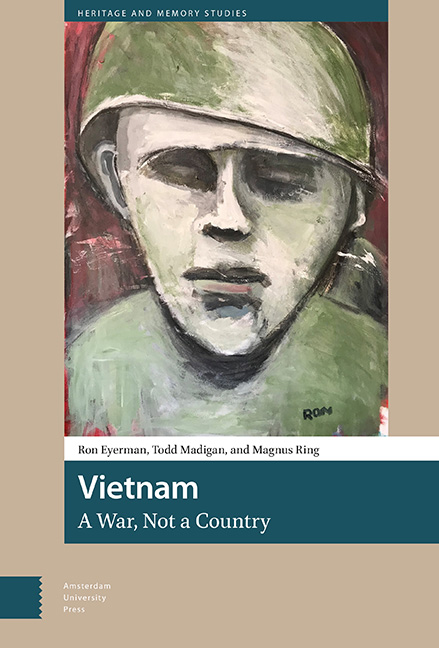Book contents
- Frontmatter
- Table of Contents
- Preface
- 1 Introduction: Cultural Trauma and the American-Vietnamese War
- 2 Cultural Trauma and Vietnamese Arenas of Memory
- 3 The Trauma of Vietnam: The American Perspective
- 4 Journey From the Fall
- 5 Cultural Trauma and Vietnamese-American Arenas of Memory
- 6 Conclusion: War, Trauma, and Beyond
- Index
6 - Conclusion: War, Trauma, and Beyond
Published online by Cambridge University Press: 29 November 2023
- Frontmatter
- Table of Contents
- Preface
- 1 Introduction: Cultural Trauma and the American-Vietnamese War
- 2 Cultural Trauma and Vietnamese Arenas of Memory
- 3 The Trauma of Vietnam: The American Perspective
- 4 Journey From the Fall
- 5 Cultural Trauma and Vietnamese-American Arenas of Memory
- 6 Conclusion: War, Trauma, and Beyond
- Index
Summary
Abstract
The chapter summarizes the book’s central arguments, particularly the American-Vietnamese War as cultural trauma. Identifying and clarifying the arenas in which collective memory is constructed and thus the development of cultural trauma, we reiterate the claim that the war was cause for cultural trauma in the United States. As the fracturing of collective identity central to cultural trauma was not present in the Democratic Republic of Vietnam, we argue that cultural trauma did not occur there. What is known as the American War was understood by a large portion of the population as a war of national liberation and a continuation of a longer struggle against foreign domination. The chapter ends with a discussion of the costs of the war and the possibility of reconciliation between the participants.
Keywords: Cultural trauma, forgiveness, reconciliation
In an age when human sensibility is finely tuned to all the nuances of despair, it still seems important to say of those who die in war that they did not die in vain. And when we can’t say that, or think we can’t, we mix our mourning with anger. We search for guilty men.
Michael Walzer, emphasis in the originalAs discussed in the Introduction, cultural trauma occurs when the taken-for-granted foundations of a collective identity are fractured and are made the object of critical debate. Most commonly, there is some precipitating occurrence of great social and political disruption—a war or natural catastrophe—that acts as catalyst. This sets in motion a trauma drama, with collective efforts to locate the causes, to name those responsible, and to identify the necessary steps towards recovery and repair. The re-narration of collective identity is central to this process. The discourse around collective identity is intimately intertwined with collective memory. Such identity, or identification—be it with family, an institution or profession, ethnic group, or nation—is rooted in a reconstructed past as well as present and is as concerned with the future as the past. This selected and filtered past, lying somewhere between myth and history, takes form in a narrative, a shared story of who ‘we’ are and came to be, as well as being embodied in material objects such as memorials and museums and embedded in ritual practices like holiday celebrations and commemorations.
- Type
- Chapter
- Information
- Vietnam, A War, Not a Country , pp. 327 - 356Publisher: Amsterdam University PressPrint publication year: 2023



